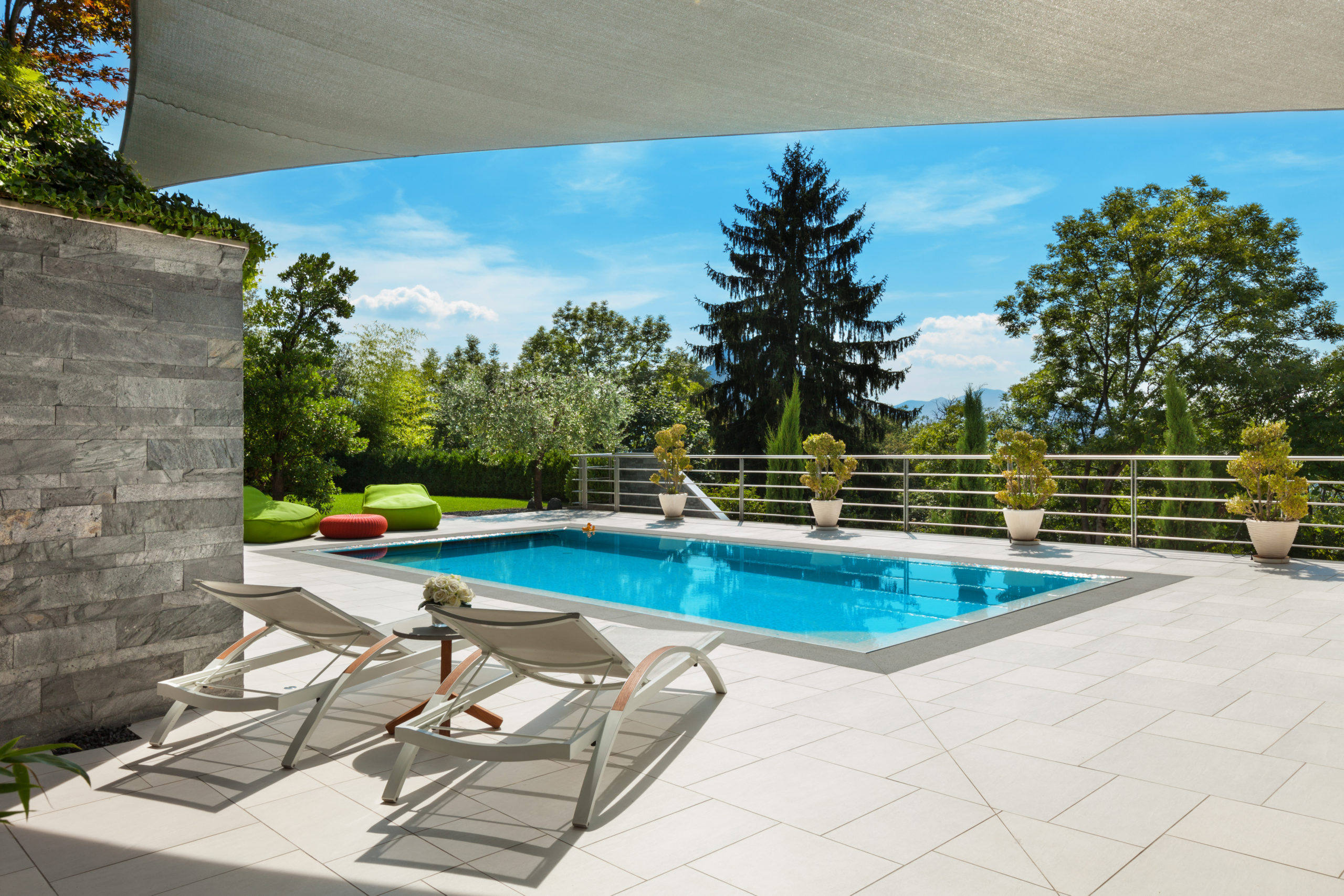Saltwater and freshwater pools are both extremely popular options for anyone looking to create a stunning backyard oasis. But knowing which to choose isn’t always obvious. So what’s the difference between the two, anyway?
In this blog, we’ll explain the major differences between saltwater and freshwater pools and the pros and cons of each option!
Saltwater Versus Freshwater Pools: What’s The Difference?
Saltwater and freshwater pools differ in their methods to keep water bacteria-free. Saltwater pools use salt chlorinators, also called salt generators, to split salt into hydrogen and hypochlorous acid using electrolysis. By contrast, freshwater pools use chlorine tablets or granules. Owners physically add these to the water by hand to kill any germs according to the vendor’s instructions.

Pros And Cons
Saltwater Pool Pros
- Pleasant smell. Hypochlorous acid is mild and doesn’t produce a pungent smell
- Softer water feel. Water in saltwater pools feels physically softer to the touch. Moving through it is silky smooth
- Continuous chlorination. Saltwater pools also offer continuous chlorination, as long as the chlorinator has power. There is less chance that sanitation will go out of balance
- Affordable. Saltwater pools don’t require constant additives. Consequently, they can be cheap to run long-term
Saltwater Pool Cons
- More difficult to learn. It can take time to figure out whether your pool is adequately chlorinated
- Corrosive. When salt and water mix, they can cause damage to metal and other materials. As such, you will need to pay close attention to your surrounding hardscaping and ensure that it is salt-resistant
- High upfront cost. The complexity of the chlorination system pushes the price up by $1,500 to $2,500, depending on the system you choose
Freshwater Pool Pros
- No initial equipment cost. Freshwater pools don’t use chlorinators. Therefore, you avoid this initial upfront cost
- Lower equipment maintenance. The absence of salt means that corrosion and wear and tear on machinery and hardscaping is lower
Freshwater Pool Cons
- Harsh water texture. The texture of water in freshwater pools feels quite harsh because of the presence of chlorine. It can irritate the skin and eyes, with some people being more sensitive than others
- Ongoing sanitation cost. Adding new chlorine to the water costs between $300 and $800 per year, depending on the size of the pool
- Difficulty maintaining sanitary conditions. Sanitation of freshwater pools does not happen automatically. Owners must regularly add new chlorine tablets and granules in the correct quantity to keep germs at bay
What To Consider When Purchasing A Freshwater Or Saltwater Pool
If you are considering purchasing a freshwater pool, you should:
- Keep the pool free from debris on a daily basis
- Clean the liner and underwater surfaces of the pool frequently
- Use ionizing pool cleaning systems that use electricity to discourage bacterial growth
- Keep water circulating in your pool
- Brush down steps and ladders
- Vacuum the bottom of the pool to remove sediment and contaminants
What Style Is Best For Saltwater Pools?
Fiberglass-style pools are best for saltwater pools. The material is strong enough to hold water and is one-hundred percent corrosion-resistant.
Unfortunately, concrete constructions are not suitable for saltwater pools. Chlorinators are significantly more abrasive than regular chlorine on concrete surfaces. If you mix saltwater with concrete, you will need to resurface it more frequently.
Because of the risk of corrosion, metal-walled vinyl pool liners are not ideal. They may corrode over time.
What Style Is Best For Freshwater Pools?
Because freshwater pools do not contain salt, the risk of corrosion is lower. Water may still damage pool construction materials, but not to the same extent. As such, metal-walled vinyl, concrete, and fiberglass are all suitable options.
Which Is More Expensive: Saltwater Or Freshwater Pools?

Saltwater pools are more expensive upfront because owners have to invest in the chlorination systems. However, freshwater pools are more expensive long-term because of the need to continuously re-chlorinate them over time.
Therefore, saltwater pools may be the cheaper option. Upfront, they may cost an extra $2,500. However, if they can save homeowners $300 per year for ten years, that’s a total savings of $3,000 over a decade.
Why Procare Landscapes Is The Best Company For Local Pool Installation
Procare Landscapes is the best company for pool installation because of our team, passion and decades of landscaping experience! We have a vast selection of pool designs to choose from, and we work to keep you in the loop every step of the way. What’s more, we’re offering free landscape design for a limited time, so sign up while you can!
